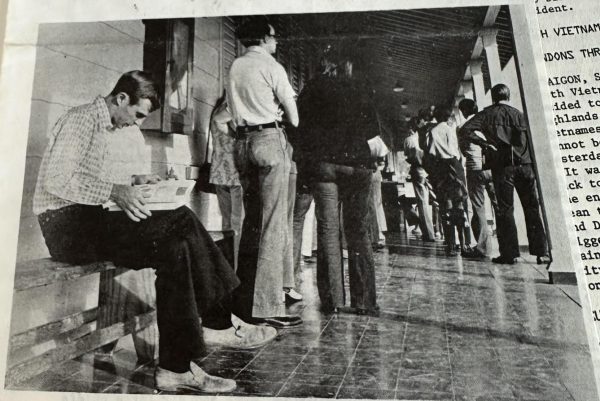Assignments Due on Spring Break. Tests Due Saturday Night. The Digital Age Has Made Students More Accessible — And Exploitable.

Professor Jeremy Moody speaks on a panel about AI integration into the classroom on Feb. 6, 2023. Photo courtesy ODU Libraries and the Center for Faculty Development.
Tests opening and closing on Saturdays. Work due in the middle of Spring Break. Professors assigning work on holidays. Late nights spent writing papers that need to be turned in by 11:59 p.m.
These are some of the ways that college has changed since your parent’s generation. Before assignments were digital, your professor couldn’t email you at 9 p.m., or contact you outside of class at all. Homework couldn’t be assigned last minute or the day before class, and tests had to be taken and returned in person. Notes were taken by hand and research conducted in a library.
Then, there was a distinct line between at school and off campus. Now, the line is blurry. Just like how remote work has created a “always-available” work environment, so has semi-digital schooling. Although most classes may be in person, professors can schedule emails to send to students at midnight, and all classes are managed on an online platform, such as Canvas. Students without laptops or internet access are plunged back 20 years and have to work in the library or at a computer lab to manage their homework.
While a digital grading platform makes getting grades in faster for many students, it also creates an environment where syllabus changes and last-minute assignments place students in highly stressful situations – with not a lot of recourse.
Students can file a grade appeal over a last minute assignment or due-date change that results in an unfavorable grade, on the basis of caprice, but should the process go to a Grade Appeal hearing, the student is barred from bringing any kind of representation. If the Grade Appeal Review Committee finds the instructor at fault and the instructor does not accept the “suggestion” to change the grade, only the Provost and the Vice President of Academic Affairs have the authority to change the grade. This puts an immense burden on the student, who must provide proof and independently represent themselves.
“Most professors abuse their power, most of the time,” said Jeremy Moody, adjunct instructor in Philosophy and Religious Studies. “And I include me. I’m in this profession, I’m a part of it, and it’s up to me to try to get others in this profession to try to change what we do.”
“We’re on the students’ time,” he pointed out. “Everything we have to do at this university, when it relates to students, we’re on the students’ time. Deadlines are good and we want to maintain them.”
“If you are teaching a course – which, I don’t care if you have a research position – if you are standing in front of a classroom full of students, you are teaching, and what is the point of teaching? It is so students can learn,” he said. “…Time is relative. Your life matters more to me than turning in an assignment on time. All I ask is for students to just keep me in the loop, because when it’s the semester, my time is your time.”
“We’re at a time right now where [understanding] that is critical. People’s lives are being taken or being lost because of misinformation on the internet. … It’s just this confounding thing of the pressures that students are coming to us are coming into, and faculty members don’t understand because they come from a different era,” Moody said.
“They don’t understand unless they have kids of their own that [students] have so much more punitive pressure put on you about school, from kindergarten, than we ever did. With Standards of Learning, and now parents are so concerned about reading levels and stuff like that. .. These are just metrics that are just used, they’re not real. People came up with it and said ‘we think this is a good idea.’ So [students] are coming to us with PTSD over education because your teacher could lose their job, your parents are putting pressure, and now the expense of college is put on you. And it’s higher than it’s ever been. So everything that you do right now is ‘I’ve got to succeed, I’ve got to succeed.’”
Tara Tassone, ODU junior, has also had issues with professors not releasing assignments, and playing with due dates in ways that cause students to have less time to complete work. She had a professor last semester announce a take-home midterm, but not tell the class what the assignment was, or when they would get it.
“He wouldn’t assign us it until Thursday, and it was due Tuesday of the following week,” she said. “So we had just the weekend to complete it. And he flat-out said ‘Say goodbye to your weekend.’”
She has also had an asynchronous communications class this semester where the professor published a schedule of when she would open modules and when the module due date is. The professor opened all of the modules late, so there was no way to anticipate how much work was going to be due week-to-week. She also didn’t push the due dates forward despite students being unable to see or access the work before she published the modules.
“She opens them one by one so there is no way to work on them ahead of time,” said Tassone. “And honestly, the classwork itself is interesting information, but it shouldn’t be this difficult to get it done.”
Online classes can also create complicated problems of privacy. Many of ODU’s online classes require students to use Respondus Lockdown Browser. Respondus functions as a cheating deterrent, intended to prevent students from having others sit their test for them, or from using their phones to find answers.
Respondus temporarily locks student devices, taking control of the screen and the device’s camera, and doesn’t allow navigation to any element of the student’s device other than the test until it is completed and the Respondus session has ended. Respondus requires students to present a photo ID, which it takes a picture of, and then it records the screen, as well as the student’s audio and video. It doesn’t matter if the student is taking a class at home, or in the library: they are required to record a video of their entire environment that is analyzed by the Respondus Monitor System. Then, the system creates a “temporary template of facial features” that it uses to determine if the student is cheating or not. The data is then stored on Respondus’ server.
Opting out of this can have heavy consequences – including having to forfeit the credit for the class if a student doesn’t feel comfortable using the software. Oftentimes, teachers don’t offer any alternatives to the software.
Tassone took a class last summer that used the lockdown browser.
“It did make me a little bit uncomfortable,” she said. “I’m putting this blind trust in this third party app that the school is trusting or the professor is trusting, but with the rise of security breaches, I just don’t know. How secure is that information?”
Moody has harsher words.

“It’s b*llshit. It’s data collecting for a third-party, for-profit entity. Having students, regardless of gender identity or age, give any outside entity complete and full access to your computer, basically spyware, is not good. And particularly for-profit companies,” he said.
“It’s complete garbage. It is your personal information, you should not be punished because [of] your ability or inability to be at a place in person. …[It’s] mind blowing to hear faculty members talk about stuff like this… you’re literally forcing your students to waive their protections and rights. It’s not even providing free data to a for-profit entity. They’re paying to give their data and their personal information to a for-profit company. The words don’t exist to describe how completely ludicrous that is. It’s exploitation. It’s the worst kind of exploitation, because you’re paying to be here.”
Ultimately, it is up to each individual professor to decide to use a lockdown browser or not; ODU grants them that discretion. But in a nation of free speech and academic freedom, how much unregulated freedom and control should professors have over students?
The Grade Appeal Review Committee can’t compel professors to alter grades, only suggest grade changes. And while students are compelled to follow the guidelines laid out by the professor in the syllabus, many times professors don’t adhere to the syllabus they make.
“I … [had] a class last semester where … [the professor] didn’t really follow the syllabus,” said Tassone. “She didn’t give us specific structure in regards to what was expected of us for these projects, or any guidelines or parameters. It was awful…We were all scrambling to discover what she wanted, and she would lower our grades if it wasn’t what she wanted, but at the same time we didn’t know what she wanted because it was never specifically written. There would be a brief but you couldn’t understand it, she would give no clarification.”
Tassone wishes that ODU would require professors to provide clear expectations and follow the due dates that they publish, or extend due dates if students are provided the material late.
“No student should have to go through that, to not have access to their assignments and not know what’s coming up.”
Moody believes that there are flaws within academia, but they can be corrected by faculty challenging the way things have always been done.
“I’m lucky to be in your life. I have a job because you’re signing up for the courses I teach. That’s my responsibility when I’m in that classroom. Whether or not I have a research position, whether or not I’m writing books or articles, does not matter when I am in the classroom. That is not my role. My role is to navigate you through this world. And again, most professors go to the old mentality of the academy that we are gatekeepers. We are not gatekeepers anymore. The information is available, we have to navigate through that, but that mentality is still there, so there’s still this power dynamic.”
“I have to be critical of my profession. That’s the only way changes will be made. That’s the only way people will get it, because if the students are critical people are going to be like, ‘it’s just students, they’re just lazy.’ And [students] aren’t, this is the mind blowing thing for me. You guys are the least lazy generation I’ve seen.”

Sydney Haulenbeek is an English major and senior, graduating in May of 2023. Before becoming the Editor in Chief of the Mace & Crown she worked as...











